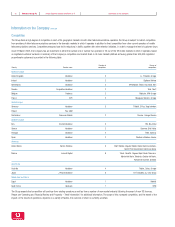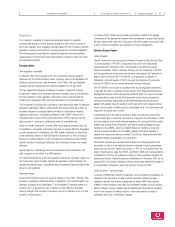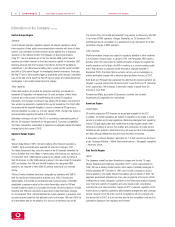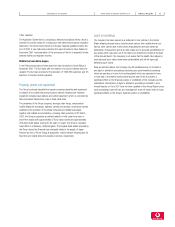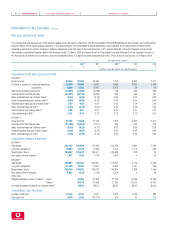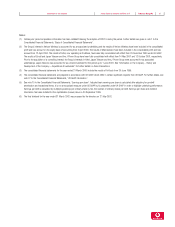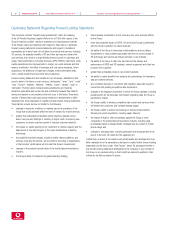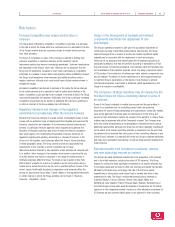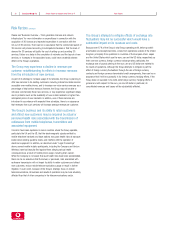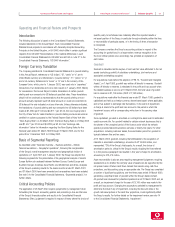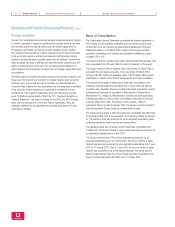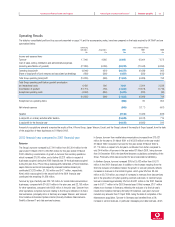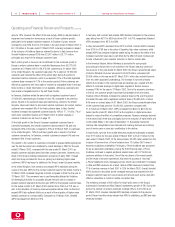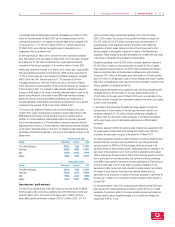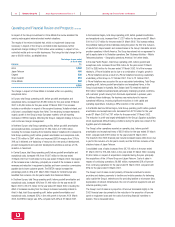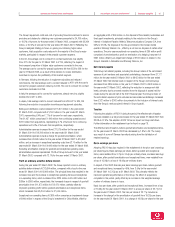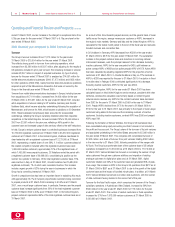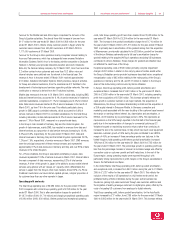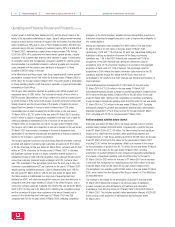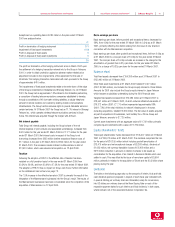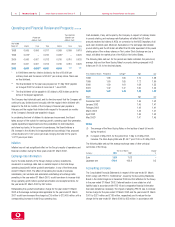Vodafone 2002 Annual Report Download - page 34
Download and view the complete annual report
Please find page 34 of the 2002 Vodafone annual report below. You can navigate through the pages in the report by either clicking on the pages listed below, or by using the keyword search tool below to find specific information within the annual report.
Vodafone Group Plc Annual Report & Accounts and Form 20-F Operating and Financial Review and Prospects32
Operating and Financial Review and Prospects continued
Revenue recognition
Turnover from mobile telecommunications primarily comprises amounts charged
to contract customers in respect of monthly access charges, which are invoiced
and recorded as part of a periodic billing cycle, and airtime usage which is
recognised as the mobile services are provided. Unbilled turnover resulting
from mobile services provided to contract customers from the billing cycle date
to the end of each period is accrued and unearned monthly access charges
relating to periods after each accounting period end are deferred. Turnover from
sales of prepaid call cards is deferred until such time as the customer uses the
airtime or following expiry of the card. The overriding principle followed is to
match revenues with the provision of service and, accordingly, leaves little scope
for subjectivity.
One further aspect of revenue recognition concerns the amounts received by the
Group upon first connecting a customer to a cellular network. Such connection
revenues, which may include the cost of purchase of mobile handsets and
connection fees, together with any associated costs, are recognised on activation
of the customer. If these revenues and costs were to be deferred over the
estimated life of the customer relationship, using the methodology required
under US Staff Accounting Bulletin (“SAB”) No. 101, “Revenue Recognition in
Financial Statements”, the Group’s revenues for the 2002 and 2001 financial
years would be reduced by £1,044m and £492m respectively. Profits are
materially unaffected by this adjustment as a broadly equal amount of costs
would also be deferred.
Basis of Consolidation
The Consolidated Financial Statements consolidate the financial statements of
the Company and its subsidiary undertakings and include the Group’s share
of the results of its joint ventures and associated undertakings for financial
statements made up to 31 March 2002. A listing of the Group’s principal
subsidiary undertakings, joint ventures and associated undertakings is given
on pages 123 to 125.
The results of AirTouch, including the results of the acquired US businesses, have
been consolidated from 30 June 1999, the date of completion of the merger.
The Group’s interest in Verizon Wireless, which was formed on 3 April 2000, is
accounted for using equity accounting. In the year ended 31 March 2000,
turnover of £2,585 million and operating losses of £100 million (after goodwill
amortisation) in respect of the Group’s US businesses were fully consolidated.
The results and net assets of Mannesmann have been consolidated in the
Company’s financial statements with effect from 12 April 2000, the date the
acquisition was completed, following conditional European Commission consent.
Businesses sold following the acquisition of Mannesmann, including Atecs
Mannesmann AG, Orange plc, Mannesmann’s watches and tubes businesses,
Infostrada and tele.ring, have not been consolidated in the results for the year
ended 31 March 2001. See “ Information on the Company – Sales of
businesses”above. Up until 15 January 2002, the Group’s remaining interest in
Atecs Mannesmann AG was treated as an asset held for resale.
The results and net assets of Airtel have been fully consolidated with effect from
29 December 2000. Prior to the acquisition of a controlling interest, the Group’s
21.7% interest in Airtel was accounted for as an associated undertaking within
continuing operations under the equity accounting method.
The operating results and net assets of Eircell have been consolidated from
14 May 2001. The Group’s interest in Grupo Iusacell has been accounted for as
an associated undertaking from 4 April 2001.
The Group’s interest in the J-Phone Group has been accounted for as an
associated undertaking up to 11 October 2001. The Group’s interest in Japan
Telecom has also been accounted for as an associated undertaking from 1 June
2001 to 11 October 2001. Prior to 1 June 2001, the Group’s interest in Japan
Telecom was accounted for as a fixed asset investment. The results and net
assets of Japan Telecom and the J-Phone Group were fully consolidated in the
Group’s financial statements with effect from 12 October 2001.


